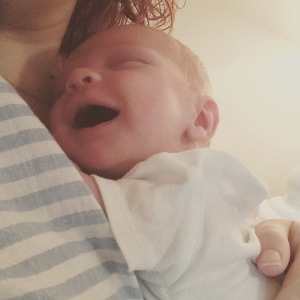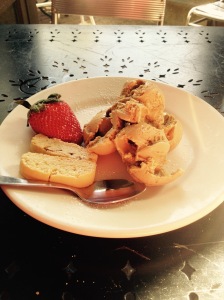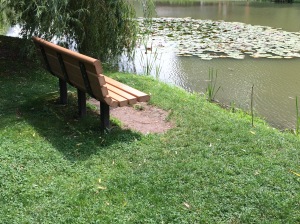As I mentioned in my first post, I wasn’t always a Happy Pharmacist. Like many other professionals, it took a lot of trial and error for me to find a career option that fits my life. Of course, priorities change over the years, and more experience will only help to gain a better perspective. Here’s what I learned at each of my jobs:
Job #1: Chain Retail Pharmacy Management
After graduation, I started my career where many pharmacists do: chain retail pharmacy. I was quickly promoted from staff pharmacist to manager when my well-liked partner had to take a medical leave of absence. I had big shoes to fill, but a great rapport with my staff and a supportive boss helped with the transition. The stresses of working retail will always remain the same, but we laughed our way through the chaos.
When my husband matched into his medical residency, I was transferred to a management position in a store outside the city. I still share horror stories from that store, like the time I separated my technician and cashier during a near fistfight. The staff used to take bets on how long their current pharmacy manager would last (they told me this on my first day). My boss told me I couldn’t reprimand them, because if they left or were fired, no one would want to work the store. My request to step down from management and float to different pharmacies was denied. Those who bet I’d last six months won the office pool.
What I Learned: Who you work for/with will be the #1 determiner of your work happiness.
Job #2: Clinical Pharmacy “Desk Job”
When I inevitably crashed and burned, a job offer from a major insurance company seemed like it would be my salvation. I would spend my days calling patients with diabetes and other chronic diseases, offering compliance tips and suggesting additional therapies. Eight-hour shifts! Four weeks vacation! Thirty-minute lunch break!! I decorated my shiny new cubicle with adorable accessories from the Container Store. I was the go-to person for organizing office baby showers and employee appreciation bagel breakfasts. At first, it was heaven.
But six months later, the cracks began to show. It’s easy to evaluate a pharmacist’s performance in retail pharmacy. How many prescriptions did you fill? What were your sales? In clinical pharmacy, it’s a little trickier. Soon, I felt pressured by management to suggest additional therapies, even when they weren’t clinically appropriate. But the real reason I left was the ridiculous vacation policy. It once took me six months to get a one-week vacation approved. I was even denied a few hours off to have stitches removed after a medical procedure. Our senior management was located over 2000 miles away, so we had no way to advocate for our right to use an earned benefit, other than emails that were ignored or very curtly responded to. I felt like a colonist: no vacation, no representation!
What I Learned: When you work for a company that does not value your time as a professional, you will not be happy.
Job #3: The Big Box Store That Shall Not Be Named
I took a huge pay cut to work my cushy desk job, and it wasn’t even cushy! Frustrated, I decided to return to retail. I never disliked retail as an entity, but instead was pushed out by an unruly staff and the pressures of management. So, I put in an application to float to different pharmacies located within The Big Box Store That Shall Not Be Named.
Halfway through the (ridiculously long) interview process, the higher-ups informed me that they thought I’d be PERFECT to manage one of their locations in a popular Pittsburgh shopping area. “Little ol’ me?!” I thought. “They must have a lot of confidence in me!” Flattered, I tried to convince myself that this time would be different. Of course, I had no idea what I was in for.
The culture at this company was extremely passive aggressive. They expected you to conform, and those were not super bubbly, social and equally passive aggressive were considered a “problem.” I was shunned by my (non-pharmacist) supervisor when I did not attend hour-long “executive” meetings… ON A MONDAY AFTERNOON. Most Mondays, I’m lucky if I can even eat lunch! I was told that I was “too closed off” since I spent most of my time filling prescriptions, and not interacting with other employees (I only had one technician who did not work the entire ten-hour shift). Pretty soon, my staff could smell blood in the water and would oh-so-passive-aggressively tell my supervisor that the stress was affecting my attitude. Still, as this was my third job since graduation, I hung on for dear life… until the day I was accused of lying over something completely trivial (I hadn’t) and told I could not be trusted.
What I Learned: Company culture is extremely important/know when it’s time to leave.
That afternoon, I sat on my couch in tears, wondering how I would pay my bills. I gave myself exactly three hours to wallow, after which I contacted every pharmacist I knew to see who was hiring (and of course, had some wine). Luckily for me, quite a few of my colleagues/now current coworkers were also exiles from The Big Box Store That Shall Not Be Named. And wouldn’t you know it? One week later, I was hired to work as a floating pharmacist for the same company where I started my career. Ironically, I ended up doing exactly what I wanted to do in the first place: retail pharmacy, but without the stresses of management or the potential for staff drama.
Sometimes, I wonder what would have happened if I could have floated from the start, or after I requested it after my breakdown at Job #1. However, I’m incredibly grateful for all my work experiences, mostly because of awesome coworkers I still keep in touch with, and because I learned the most important lesson of them all:
Listen to the little voice inside of you that’s telling you what to do. That voice is usually right.



